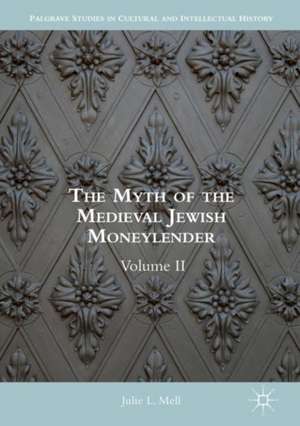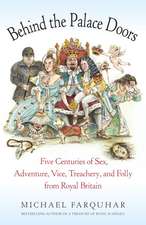The Myth of the Medieval Jewish Moneylender: Volume II: Palgrave Studies in Cultural and Intellectual History
Autor Julie L. Mellen Limba Engleză Hardback – 20 noi 2017
| Toate formatele și edițiile | Preț | Express |
|---|---|---|
| Paperback (1) | 470.56 lei 6-8 săpt. | |
| Springer International Publishing – 28 aug 2018 | 470.56 lei 6-8 săpt. | |
| Hardback (2) | 643.00 lei 6-8 săpt. | |
| Springer International Publishing – 20 noi 2017 | 643.00 lei 6-8 săpt. | |
| Palgrave Macmillan US – 3 oct 2017 | 895.58 lei 6-8 săpt. |
Din seria Palgrave Studies in Cultural and Intellectual History
-
 Preț: 383.12 lei
Preț: 383.12 lei -
 Preț: 387.38 lei
Preț: 387.38 lei - 15%
 Preț: 584.76 lei
Preț: 584.76 lei -
 Preț: 387.75 lei
Preț: 387.75 lei - 15%
 Preț: 642.51 lei
Preț: 642.51 lei - 15%
 Preț: 691.73 lei
Preț: 691.73 lei -
 Preț: 387.75 lei
Preț: 387.75 lei -
 Preț: 389.70 lei
Preț: 389.70 lei -
 Preț: 390.63 lei
Preț: 390.63 lei - 15%
 Preț: 646.62 lei
Preț: 646.62 lei -
 Preț: 389.70 lei
Preț: 389.70 lei -
 Preț: 390.63 lei
Preț: 390.63 lei -
 Preț: 392.37 lei
Preț: 392.37 lei -
 Preț: 417.14 lei
Preț: 417.14 lei -
 Preț: 211.16 lei
Preț: 211.16 lei -
 Preț: 388.72 lei
Preț: 388.72 lei -
 Preț: 386.00 lei
Preț: 386.00 lei - 15%
 Preț: 643.34 lei
Preț: 643.34 lei -
 Preț: 386.81 lei
Preț: 386.81 lei -
 Preț: 387.75 lei
Preț: 387.75 lei -
 Preț: 389.70 lei
Preț: 389.70 lei -
 Preț: 388.72 lei
Preț: 388.72 lei -
 Preț: 390.63 lei
Preț: 390.63 lei - 15%
 Preț: 649.06 lei
Preț: 649.06 lei - 15%
 Preț: 641.71 lei
Preț: 641.71 lei - 15%
 Preț: 643.34 lei
Preț: 643.34 lei -
 Preț: 395.47 lei
Preț: 395.47 lei - 15%
 Preț: 644.82 lei
Preț: 644.82 lei -
 Preț: 389.70 lei
Preț: 389.70 lei - 15%
 Preț: 642.51 lei
Preț: 642.51 lei -
 Preț: 384.86 lei
Preț: 384.86 lei - 18%
 Preț: 778.90 lei
Preț: 778.90 lei -
 Preț: 389.70 lei
Preț: 389.70 lei -
 Preț: 385.84 lei
Preț: 385.84 lei -
 Preț: 390.63 lei
Preț: 390.63 lei -
 Preț: 388.72 lei
Preț: 388.72 lei
Preț: 643.00 lei
Preț vechi: 756.47 lei
-15% Nou
Puncte Express: 965
Preț estimativ în valută:
123.03€ • 128.47$ • 101.60£
123.03€ • 128.47$ • 101.60£
Carte tipărită la comandă
Livrare economică 15-29 aprilie
Preluare comenzi: 021 569.72.76
Specificații
ISBN-13: 9783319341859
ISBN-10: 3319341855
Pagini: 237
Ilustrații: XX, 264 p. 20 illus.
Dimensiuni: 148 x 210 x 22 mm
Greutate: 0.49 kg
Ediția:1st ed. 2018
Editura: Springer International Publishing
Colecția Palgrave Macmillan
Seria Palgrave Studies in Cultural and Intellectual History
Locul publicării:Cham, Switzerland
ISBN-10: 3319341855
Pagini: 237
Ilustrații: XX, 264 p. 20 illus.
Dimensiuni: 148 x 210 x 22 mm
Greutate: 0.49 kg
Ediția:1st ed. 2018
Editura: Springer International Publishing
Colecția Palgrave Macmillan
Seria Palgrave Studies in Cultural and Intellectual History
Locul publicării:Cham, Switzerland
Cuprins
Chapter 1 The Discourse of Usury and the Jewish Usurer in medieval France.- .Chapter 2 Commercialization among the Jewish Merchants of Marseille.- .Chapter 3 From Gift Exchange to Profit Economy reconsidered: Towards a Cultural History of Money.- .Conclusion ‘Which is the Merchant here? And which the Jew?’.
Recenzii
“This book is a seriously adept piece of scholarship which I suspect (and hope) will become an instant classic for students of medieval Jews in general and of medieval Anglo-Jewry specifically.” (Towards a Bibliography of Medieval Anglo-Jewry, anglo-jewishbibliography.blogspot.de, January, 2017)
Notă biografică
Julie L. Mell is Associate Professor of History at North Carolina State University, USA where she teaches courses in medieval history and Jewish history. She has published in Jewish Historical Studies, Jewish History, and the Wiener Jahrbuch für Jüdische Geschichte Kultur und Museumswesen, and received fellowships from the Yad HaNadiv, the Memorial Foundation for Jewish Culture, and the American Association of University Women.
Textul de pe ultima copertă
This book challenges a common historical narrative, which portrays medieval Jews as moneylenders who filled an essential economic role in Europe. Where Volume I traced the development of the narrative in the nineteenth and twentieth centuries and refuted it with an in-depth study of English Jewry, Volume II explores the significance of dissolving the Jewish narrative for European history. It extends the study from England to northern France, the Mediterranean, and central Europe and deploys the methodologies of legal, cultural, and religious history alongside economic history. Each chapter offers a novel interpretation of key topics, such as the Christian usury campaign, the commercial revolution, and gift economy / profit economy, to demonstrate how the revision of Jewish history leads to new insights in European history.
Caracteristici
Volume I available here: https://www.palgrave.com/9781137397768 Illuminates how changes in Jewish history change our understanding of European history Refutes the narrative of the Jewish moneylender with an in-depth economic study of the Jewish community in medieval Europe Offers a novel interpretation of central topics, such as the usury debate, commercial contracts, and moral literature on money and value










